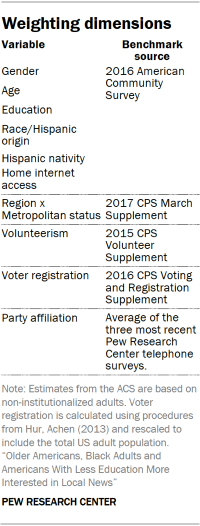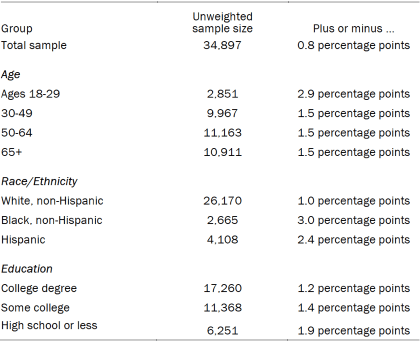This report is based on a nationally representative Pew Research Center survey of 34,897 U.S. adults, conducted October 15-November 8, 2018, on both the Center’s American Trends Panel (ATP) and Ipsos’s KnowledgePanel. This report was made possible by The Pew Charitable Trusts, the Center’s primary funder, which received support from the Google News Initiative.
The ATP and KnowledgePanel are national probability-based online panels of U.S. adults. Panelists participate via self-administered web surveys. On both the ATP and KnowledgePanel, panelists who do not have internet access are provided with an internet connection and device that can be used to take surveys. Interviews are conducted in both English and Spanish. The ATP is managed by Ipsos.
All active ATP panel members were invited to participate in this survey. All members of the KnowledgePanel living in the 53 most populous CBSAs were invited to participate, while those in less populous CBSAs were sampled at a lower rate. Of the 34,897 respondents in total, 10,654 came from the ATP and 24,243 came from the KnowledgePanel.
The ATP was created in 2014, with the first cohort of panelists invited to join the panel at the end of a large, national, landline and cellphone random-digit-dial survey that was conducted in both English and Spanish. Two additional recruitments were conducted using the same method in 2015 and 2017, respectively. Across these three surveys, a total of 19,718 adults were invited to join the ATP, of which 9,942 agreed to participate.
In August 2018, the ATP switched from telephone to address-based recruitment. Invitations were sent to a random, address-based sample (ABS) of households selected from the U.S. Postal Service’s Delivery Sequence File. In each household, the adult with the next birthday was asked to go online to complete a survey, at the end of which they were invited to join the panel. For a random half-sample of invitations, households without internet access were instructed to return a postcard. These households were contacted by telephone and sent a tablet if they agreed to participate.
KnowledgePanel uses a combination of random-digit dialing (RDD) and address-based sampling (ABS) methodologies to recruit panel members (in 2009 KnowledgePanel switched its sampling methodology for recruiting members from RDD to ABS).
KnowledgePanel continually recruits new panel members throughout the year to offset panel attrition as people leave the panel.
Weighting
 The data were weighted in a multistep process that begins with a base weight incorporating the respondents’ original survey selection probability and the fact that in 2014 and 2017 some ATP respondents were subsampled for invitation to the panel. The next step in the weighting uses an iterative technique that aligns the sample to population benchmarks on the dimensions listed in the accompanying table.
The data were weighted in a multistep process that begins with a base weight incorporating the respondents’ original survey selection probability and the fact that in 2014 and 2017 some ATP respondents were subsampled for invitation to the panel. The next step in the weighting uses an iterative technique that aligns the sample to population benchmarks on the dimensions listed in the accompanying table.
A total of 34,897 panelists responded out of 62,757 who were sampled, for a response rate of 56%. The cumulative response rate accounting for nonresponse to the recruitment surveys and attrition is 1.8%. The margin of sampling error for the full sample of 34,897 respondents is plus or minus 0.8 percentage points.
Sampling errors and statistical-significance tests take into account the effect of weighting. In addition to sampling error, one should bear in mind that question wording and practical difficulties in conducting surveys can introduce error or bias into the findings of opinion polls.
The following table shows the unweighted sample sizes and the error attributable to sampling that would be expected at the 95% level of confidence for different groups in the survey:

Sample sizes and sampling errors for other subgroups are available upon request.
© Pew Research Center, 2019


